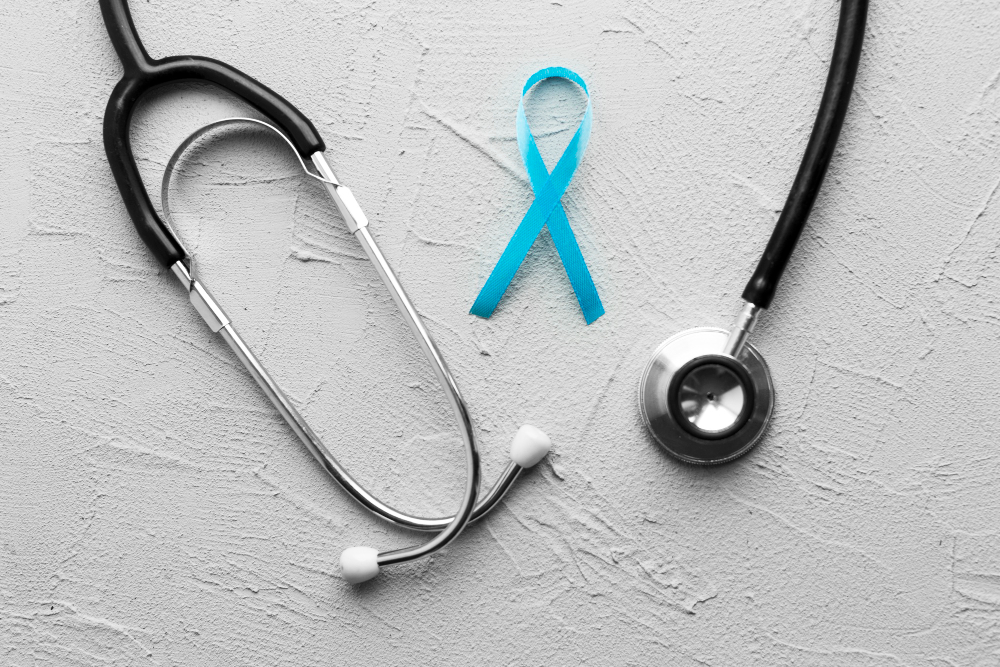The colon, which makes up the longest part of the large bowel, plays a vital role in digestive health. As the remains of food pass through the colon, the last remaining nutrients and water are absorbed, and the waste is then forced out through the rectum as stool. Cancer that forms in the colon or rectum is often grouped together as colorectal cancer.
The American Cancer Society estimates that roughly 150,000 new cases of colorectal cancer are detected every year. Thankfully, colon and rectal cancer is conveniently discoverable by a colonoscopy and, when identified early, the probability of surviving it is very good. To find a colonoscopy specialist nearby and get a colorectal cancer exam, contact a GI Alliance location near you.
March is Colorectal Cancer Awareness Month, and GI Alliance aims to provide you with the essential items you should know concerning colorectal cancer to help keep you and your family healthy. Keep reading to find out five crucial items about colon and rectal cancer.
#1: Colon and rectal cancer is the second leading reason for cancer fatalities.
Colorectal cancer is the second most cause of cancer fatalities among women and men combined. The American Cancer Society estimates that roughly 52,000 patients will die from colorectal cancer in 2022. Due to routine colonoscopies and colon cancer awareness across the nation, colorectal cancer fatalities are diminishing. Regrettably, it is calculated that approximately one-third of adults in the United States are not current on their regular colonoscopy screenings.
#2: Colon and rectal cancer affects both sexes equally.
The American Cancer Society estimates that roughly 1 in 23 men and 1 in 25 women will develop colorectal cancer sometime in the course of their lives. This means that gender is not a colon and rectal cancer factor of risk; both men and women have around an even chance of developing the disease. The colorectal cancer risk factors are:
- Having an inflammatory bowel disease
- Being 45 or older
- Being obese
- Using cigarettes
- Excessive alcohol intake
- Having a family history of colon or rectal cancer
#3: There may be no signs of colon or rectal cancer.
Per the Colon Cancer Coalition, six out of every 10 individuals identified with colon cancer are diagnosed with late-stage disease, most likely because they did not get a colonoscopy until there were indicators of a threat. Women and men in the early stages of colorectal cancer will likely present no signs of the illness, and when the disease does exhibit signs, it is likely highly progressed. If you are exhibiting symptoms of colorectal cancer, they could likely be:
- An alteration in bowel habits, like chronic diarrhea or extended constipation
- Unexplained weight loss
- Rectal bleeding
- Tiredness
- Stomach distress or irritation
If you or a loved one is experiencing these concerning colorectal cancer signals, contact a gastrointestinal specialist to schedule a colonoscopy as soon as possible. You can find a local GI specialist by contacting GI Alliance.
#4: When detected ahead of time, colon and rectal cancer is highly treatable.
Colon growths can take as long as 10 – 15 years to develop into cancer. Pre-malignant polyps can be removed long before they begin to pose a problem, which makes colorectal cancer highly preventable in comparison with other cancers. Men and women who are identified with early, limited colon and rectal cancer have a significantly improved survival rate than those whose colorectal cancer has spread. The five-year odds of survival for limited colon and rectal cancer is about 90%. When diagnosed late, the five-year odds of survival drop to smaller than 10%. Please do not wait for signs before being examined.
#5: You should start standard colon cancer screenings by 45 years old.
If you are at average risk for colon cancer, then the U.S. Preventive Services Task Force advises you to obtain your first regular colonoscopy by 45 years old and then once every ten years if no abnormalities are found. People with a greater chance of colon cancer should have routine colonoscopies about every 3 – 5 years or as suggested by a GI physician. Several home kit choices for colorectal cancer testing have been authorized by the FDA, but the colonoscopy is still the gold standard for the discovery and prevention of colon and rectal cancer.
Find a GI physician near you
If you are behind on your routine colon and rectal cancer tests, please reach out to GI Alliance today. We can connect you with a local GI specialist who will put your support and concerns first. People facing colon cancer and other gastrointestinal conditions can rely on our physician-led network of GI specialists. If you want to learn more about the fight against colorectal cancer and how to get a colonoscopy, please get in touch with GI Alliance today.


